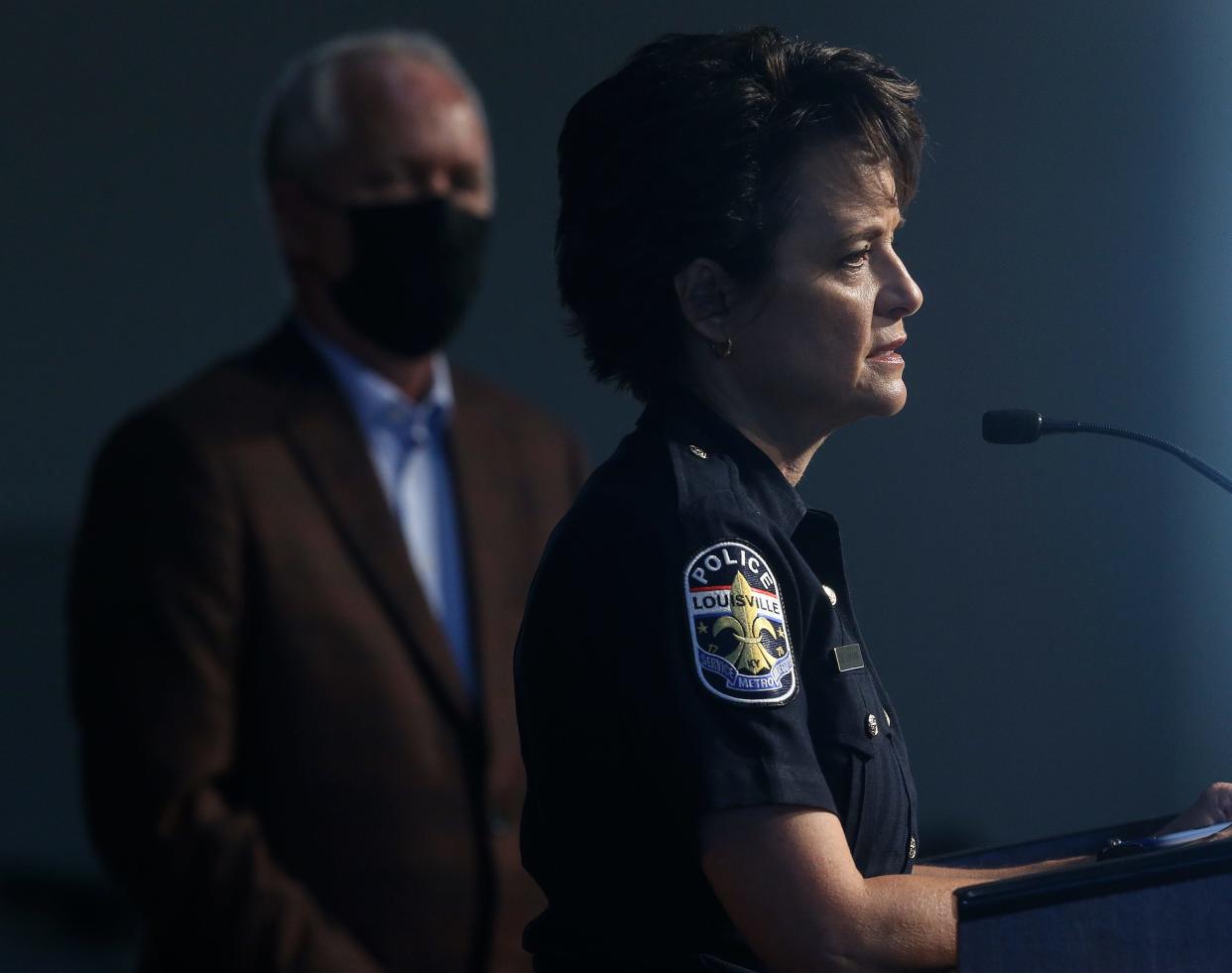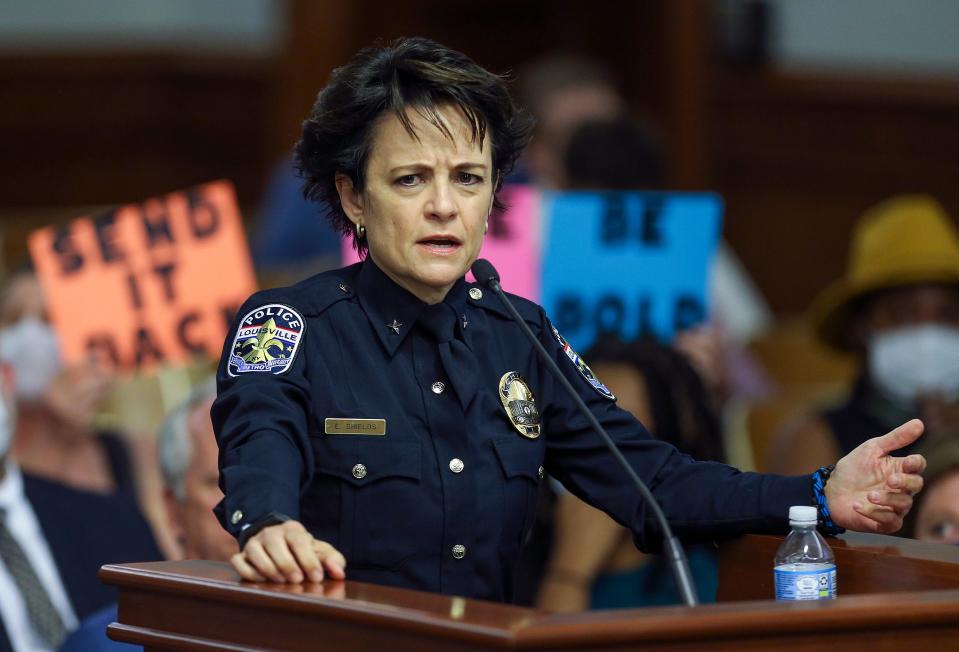Louisville mayor, LMPD chief: Justice Department report looms, but city hasn't waited to act

- Oops!Something went wrong.Please try again later.
- Oops!Something went wrong.Please try again later.
Louisville Metro Police Chief Erika Shields and Mayor Greg Fischer said Wednesday the U.S. Department of Justice is expected to release its pattern-or-practice investigation letter focused on LMPD in the "coming weeks." But in the meantime, they argued, the city has "not waited" on implementing various policing reforms.
Attorney General Merrick Garland announced in April 2021 that police departments in Louisville and Minneapolis would face federal investigations. Both cities were the site of mass protests in 2020 after officers killed Black residents — Breonna Taylor in Louisville and George Floyd in Minneapolis — in high-profile incidents that reverberated around the U.S. and the world.
Fischer, who is in the last few months of his third and final term in office, and Shields, who took over as LMPD's leader in January 2021 after several interim chiefs served following the mayor's June 2020 firing of Steve Conrad, told The Courier Journal and wrote in a Wednesday op-ed that although it is unclear exactly when in the "coming weeks" the DOJ will release its findings, the city is working to "realize our goal to become a model city for racial equity and justice" and has "made significant progress while expanding on our whole-of-government approach to public safety."
Fischer and Shields op-ed:How the city is making progress on reimagining public safety; vital work still to be done
"We feel like a lot of work has been done over the past couple of years," Fischer said during a Tuesday afternoon interview inside Metro Hall. "Obviously, 2020 was a big inflection point for the whole country. ...The big question when you face situations like that is, what are you going to do about it? Our administration has been one that when there are issues, we don't hide from them. We face them head on."
"I think cities have traditionally waited until the hammer falls, and then they drag their feet and fight it," Shields added regarding DOJ investigations. "The problem with that is if you know there's room for improvement, let's start working on it. We're moving forward, and we're making a lot of improvements we need to make it (with) a lot of work to do. It's the right thing to do."
"The profession needs rebranding on many fronts," the chief also said of policing. "But it's improving."
The city's work also is in response to a review of LMPD from a Chicago-based consulting firm, Hillard Heintze, that produced 102 recommendations for reforms and improvements in the aftermath of Taylor's killing.
It's been nearly 17 months since Garland announced the federal investigation into LMPD and the city's government. A review of DOJ investigations since 2010 into seven other police departments around the country, such as Chicago and New Orleans, show the probes took an average of 18 months to complete, with resulting consent decrees taking several years to enforce.
Asked about any updated timeline on the Louisville investigation, a DOJ spokeswoman told The Courier Journal the department is “declining comment at this time.”
Garland did not say last year whether Louisville's investigation was prompted by LMPD officers fatally shooting Taylor, a 26-year-old emergency room technician, in March 2020 during a botched narcotics raid at her apartment that turned up no drugs or money. (The FBI has been conducting a separate investigation into Taylor's killing, with the DOJ charging four former LMPD personnel in August with offenses primarily related to alleged untruthfulness on the warrant obtained for Taylor's South End apartment and also charging multiple ex-officers in separate, protest-related cases.)
More:LMPD cop hid info that Taylor's boyfriend was at apartment, had gun permit, government says
Instead, Garland said the DOJ’s investigation into LMPD and Louisville's city government would focus on whether the department:
Used unreasonable force, including during peaceful protests;
Engaged in unconstitutional stops, searches and seizures, including unlawful search warrant executions on private residences;
Discriminated against people based on race; and
Failed to provide public services in compliance with the Americans with Disabilities Act.
Though Garland's 2021 announcement did not mention Taylor's death, Fischer and Shields reiterated this week they had turned over the internal LMPD investigation to the FBI and to Kentucky Attorney General Daniel Cameron, whose office only ended up bringing wanton endangerment charges against ex-cop Brett Hankison.
A Jefferson County jury acquitted Hankison this past March before the DOJ swooped back in last month and charged him with using "unconstitutionally excessive force during the raid on Ms. Taylor's home" by blindly firing 10 shots, several of which went into an occupied, neighboring apartment.
Shields and Fischer also noted the city "quickly settled a civil suit with Breonna's family" in 2020 for $12 million, with the settlement agreement requiring several LMPD reforms, such as placing tighter rules on search warrants and affidavits.
"For accountability, due process was our guide, which we know was frustrating to some because of the time involved, but ultimately the process led to the firing of several officers as well as federal indictments," Fischer and Shields wrote in their op-ed. "We are appreciative for the federal investigation in the Breonna Taylor case, as an impartial examination was essential for the integrity of the findings."
Changes Louisville has made and hopes to still make in response to the DOJ’s pending investigation into LMPD and the city's government could cost $8 million to $10 million annually, officials told Metro Council members last fall.
Fischer and Shields both said the city and police department have cooperated with federal investigators and involved residents in reform discussions, with the mayor calling the city's collaboration with the DOJ "an open book."
Shields, who led Atlanta's police department before moving to Louisville, said she was "really encouraged" by Garland wanting to change the process in which consent decrees drag on for years, sometimes for over a decade.
"If I'm calling a community member (to say), 'Hey, we hope we get there in the next 15 years,' I mean, that's not realistic," Shields said of departments taking longer to make changes through consent decrees.

The city paid Hillard Heintze, a Chicago-based consulting firm, nearly $190,000 in 2020 amid protests over Taylor's death to conduct a review of LMPD by analyzing crime data, traffic stops, officer encounters, policies, procedure, training, recruitment and retention.
LMPD's Early Intervention System:Louisville police finally get an early warning system to flag at-risk officers. Will it help?
According to a dashboard on LMPD’s website that was set up to track progress on the Hillard Heintze plan, the department and city, as of Tuesday, have implemented 37.25% of the recommendations, with 47.06% of the suggestions “in process,” 9.8% still in “planning and development” and 5.88% “under review.”
Getting certain technology in place and integrated with the state, and also waiting for the DOJ findings, are among the reasons some recommendations have taken longer to implement, Shields said.
Throughout the process, the company gathered data, observed officers and conducted interviews with all levels of staff, as well as with community leaders. A community survey and public safety personnel survey also garnered over 10,000 responses.
The report, released in January 2021, described LMPD as a department in crisis and said "deeply strained” relationships between officers and residents of Louisville neighborhoods, particularly predominantly Black areas of the city, would “continue to worsen” until LMPD embraces a “clear path of improvement” in line with national best practices.
The 102 recommendations in the 155-page report from Hillard Heintze are broken down into a dozen topics on LMPD’s dashboard: “Bias-Free Policing,” “Community-Oriented Policing,” complaints against LMPD personnel, data analysis, “Crowd Control,” “Crisis Intervention,” Early Intervention System, “Procedural Justice,” promotion processes, recruiting and hiring, search and arrest warrants, and use of force and de-escalation.
One component that finally got fully implemented in April after years of delays is LMPD’s Early Intervention System, or EIS, which is meant to identify and help officers who may be at risk of misconduct.
Shields said she would still like technology implemented to help her and officers review performance data, such as on traffic stop demographics.
Louisville has used about $59 million of its $388 million federal American Rescue Plan allocation for public safety efforts, LMPD changes and reforms, such as setting up a new Accountability and Improvement Bureau (AIB), which is led by Deputy Chief Paul Humphrey and includes the Wellness Unit and EIS supervisors. Other efforts have related to community outreach, such as the "Truth and Transformation" initiative meant to bring officers and residents together.
Kentucky news:Half of Jenkins Eliason, the go-to designers for the Bluegrass State's elite, likely headed to prison
To increase transparency, Shields and Fischer also highlighted the creation of the Citizens Review and Accountability Board and hiring of an inspector general, and they said a boost in training, technology investments and pay for officers is helping create "a model police force." A "Crisis Call Diversion Program" that launched in March and sends social workers on some non-violent, behavioral crisis calls to free up LMPD officers has also helped over 100 people and counting so far, according to a University of Louisville report presented to Metro Council.
Two initiatives that LMPD officers have not yet bought into like leaders hoped they would, according to Shields and Fischer, are a housing credit program that would give officers $5,000 down-payment assistance to live in neighborhoods like Shively, Iroquois, Old Louisville, Shelby Park, Newburg and all of those in the West End, along with a community service incentive to encourage LMPD officers to volunteer two hours per pay period during their regular shift at a local organization.
"Importantly, we have made unprecedented investments in the non-police areas of public safety," the two wrote in their op-ed. "Our Office for Safe and Healthy Neighborhoods got a big boost this past year in the form of federal American Rescue Plan Act dollars, which allowed us to fully fund OSHN for the first time."
"This has fueled systemic outreach efforts, new programs for violence intervention and prevention, and deflection options for mental health support instead of law enforcement intervention."
Homicides and non-fatal shootings in Louisville, while already once again in the triple digits with a few months to go in 2022, are currently down over last year's levels.
Moving forward, Fischer and Shields invited residents to "take part in an online community conversation about our efforts" that will start at 2 p.m. Saturday on the mayor's Facebook page.
"Our thanks to the LMPD members who step up every day with the goal of becoming the best police department in the nation," the chief and mayor wrote. "The aim must always be constitutional policing in every corner of our city with a department supported by its most valuable assets — our residents. Our thanks also to the people who never stopped demanding justice for Breonna Taylor. They ensured her name will live as a symbol of the never-ending quest for justice and strong police-community relations."
The updates from Fischer and Shields did not go down well with all residents. Hannah Drake, a poet, writer and activist, said all the reform talk "sounds good until you see officers are lying."
"We have so much work to do in this city," Drake told The Courier Journal. "We have a department that has basically unlimited power that will lie with no regard of how it impacts anyone's life. Breonna was just collateral damage."
"As a Black woman in this city right now," Drake added, "that doesn’t make me feel safe."
This story has been updated.
Reach Billy Kobin at bkobin@courierjournal.com
This article originally appeared on Louisville Courier Journal: How Louisville changed policies amid DOJ's investigation into LMPD

